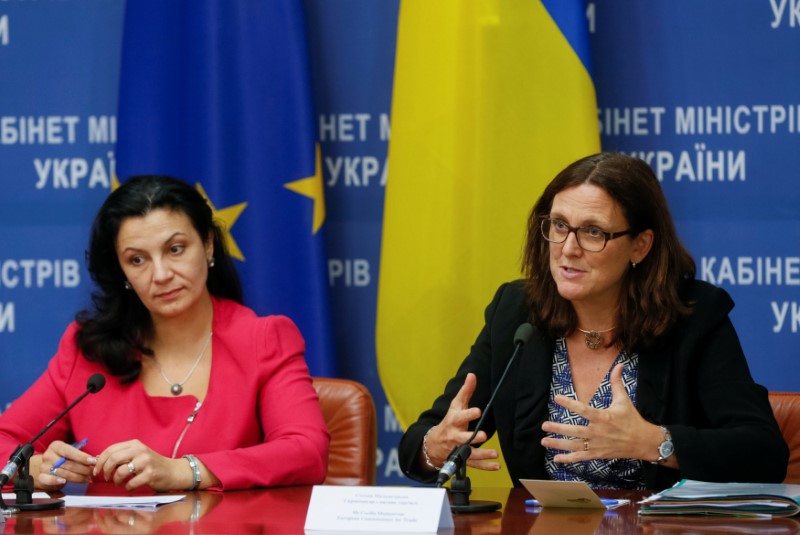By Matthias Williams
KIEV (Reuters) - The European Union has expanded the amount of produce Ukraine can export duty-free to the bloc as part of their free trade deal, but delayed disbursing a second tranche of aid pending further policy steps by Kiev, the bloc said on Friday.
A political and trade agreement between Ukraine and the EU came into force in January. Its original signing, fiercely opposed by Russia, was the spark for the popular uprising in 2014 that toppled a Kremlin-backed president.
Friday's announcement is a boon to Ukrainian exporters, some of whom had complained about the fact that the deal only allowed a fraction of farm exports to be sold without tariffs, at a time when trade between Ukraine and Russia has diminished.
The EU said it had increased the volumes that Ukraine can export duty free in goods including maize, wheat, barley, processed tomatoes and honey.
On a visit to Kiev on Friday, EU Trade Commissioner Cecilia Malmstrom said, however, that Brussels would not hand over financial assistance worth 600 million euros until Ukraine took measures that include lifting a ban on exporting its wood.
Another condition is allowing social payments such as pensions to be properly disbursed to refugees from eastern Ukraine, where fighting between Ukrainian troops and Russian-backed separatists has killed more than 9,600 people.
"We see some modest improvements in our trade, that is positive, but of course more needs to be done. So we've been encouraging our Ukrainian friends to keep on with the reforms," Malmstrom told reporters at a briefing.
She said the ban on wood exports, formally intended to protect Ukrainian furniture makers and the environment, violated the rules of the World Trade Organisation as well as the EU's bilateral trade deal with Ukraine. "And it's also a symptom of the unpredictability of the business climate because this is clearly a discriminatory thing to do," she said.
Prime Minister Volodymyr Groysman said the government would discuss the wood export ban with lawmakers to find a solution.
The trade deal is provisional and potentially under threat after a Dutch referendum in April voted to reject the agreement, which has to be ratified by all 28 EU member states in order to take effect permanently.
Asked about the potential implications of the Dutch vote, Malmstrom said: "This is of course an unprecedented situation.

I don't really know where this will land. We hope to find a solution, because this is of course an agreement that 27 other countries have ratified and is of great importance to Ukraine."